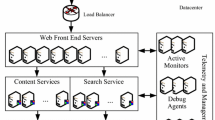Abstract
Software and other technical products offered to a mass market have a high demand on support and help desks. A tool for automated classification of incident reports, errors and other customer requests which offers previous (successful) hints or solution procedures could efficiently decrease support costs. We propose an approach to mining incidents and other customer requests for support based on generalising structural prototypes from structured data. Retrieval can then be efficiently realised by matching incoming requests against prototypes. We present an application to incident reports in an SAP business information system. Several variants of structure generalisation algorithms were realised and performance for an example test base was evaluated with promising results.
Access this chapter
Tax calculation will be finalised at checkout
Purchases are for personal use only
Preview
Unable to display preview. Download preview PDF.
Similar content being viewed by others
References
Aamodt, A., Plaza, E.: Case-based reasoning: foundational issues, methodological variations, and system approaches. AI Communications 7(1), 39–59 (1994)
Bader, F.: Model-based classification of incident reports in a business information system. Sn approach to prototype-learning by structure generalisation (in German), Unpublished mster’s thesis, University of Bamberg (2009)
Bunke, H., Messmer, B.T.: Similarity measures for structured representations. In: Wess, S., Richter, M., Althoff, K.-D. (eds.) EWCBR 1993. LNCS, vol. 837, pp. 106–118. Springer, Heidelberg (1994)
Burghardt, J., Heinz, B.: Implementing anti-unification modulo equational theory (vol. 1006; Tech. Rep.). Arbeitspapiere der GMD (1996)
Estruch, V., Ferri, C., Hernández-Orallo, J., Ramírez-Quintana, M.: Defining inductive operators using distances over lists. In: Schmid, U., Kitzelmann, E., Plasmeijer, R. (eds.) Proceedings of the 3rd Workshop on Approaches and Applications of Inductive Programming (AAIP 2009), pp. 41–64. Edinburgh (2009)
Everitt, B.S., Landau, S., Leese, M.: Cluster analysis, 4th edn. Wiley, Chichester (2001)
Geibel, P., Schädler, K., Wysotzki, F.: Connectionist construction of prototypes from decision trees for graph classification. Intelligent Data Analysis 7(2), 125–140 (2003)
Messmer, B.T., Bunke, H.: Efficient subgraph isomorphism detection: A decomposition approach. Efficient Subgraph Isomorphism Detection: A Decomposition Approach 12(2), 307–323 (2000)
Plaza, E.: Cases as terms: A feature term approach to the structured representation of cases. In: Aamodt, A., Veloso, M.M. (eds.) ICCBR 1995. LNCS, vol. 1010, pp. 265–276. Springer, Heidelberg (1995)
Plotkin, G.D.: A note on inductive generalization. In: Plotkin, G.D. (ed.) Machine intelligence, vol. 5, pp. 153–163. Edinburgh University Press (1969)
Quinlan, J., Cameron-Jones, R.: Induction of logic programs: FOIL and related systems. New Generation Computing, Special Issue on Inductive Logic Programming 13(3-4), 287–312 (1995)
Rosch, E.: Prototype classification and logical classification: The two systems. In: Scholnick, E. (ed.) New trends in conceptual representation: Challenges to Piaget’s theory?, pp. 73–86. Lawrence Erlbaum, Hillsdale (1983)
Taskar, B., Segal, E., Koller, D.: Probabilistic clustering in relational data. In: Seventeenth International Joint Conference on Artificial Intelligence (IJCAI 2001), pp. 870–887 (2001)
Wang, J.T.L., Zhang, K., Jeong, K., Shasha, D.: A system for approximate tree matching. IEEE Transactions on Knowledge and Data Engineering 6(4), 559–571 (1994)
Wiese, E., Konerding, U., Schmid, U.: Mapping and inference in analogical problem solving – As much as needed or as much as possible? In: Love, B., McRae, K., Sloutsky, V.M. (eds.) Proceedings of the 30th Annual Conference of the Cognitive Science Sociecty, pp. 927–932. Lawrence Erlbaum, Mahwah (2008)
Wilson, D.R., Martinez, T.R.: The potential of prototype styles of generalization. In: Proceedings of the Sixth Australian Joint Conference on Artifical Intelligence (AI 1993), pp. 356–361 (1993)
Yan, X., Zhu, F., Yu, P.S., Han, J.: Feature-based similarity search in graph structures. ACM Transactions on Database Systems 31(4), 1418–1453 (2006)
Zadeh, L.: A note on prototype theory and fuzzy sets. Cognition 12, 291–297 (1982)
Author information
Authors and Affiliations
Editor information
Editors and Affiliations
Rights and permissions
Copyright information
© 2010 Springer-Verlag Berlin Heidelberg
About this paper
Cite this paper
Schmid, U., Hofmann, M., Bader, F., Häberle, T., Schneider, T. (2010). Incident Mining Using Structural Prototypes. In: García-Pedrajas, N., Herrera, F., Fyfe, C., Benítez, J.M., Ali, M. (eds) Trends in Applied Intelligent Systems. IEA/AIE 2010. Lecture Notes in Computer Science(), vol 6097. Springer, Berlin, Heidelberg. https://doi.org/10.1007/978-3-642-13025-0_35
Download citation
DOI: https://doi.org/10.1007/978-3-642-13025-0_35
Publisher Name: Springer, Berlin, Heidelberg
Print ISBN: 978-3-642-13024-3
Online ISBN: 978-3-642-13025-0
eBook Packages: Computer ScienceComputer Science (R0)




